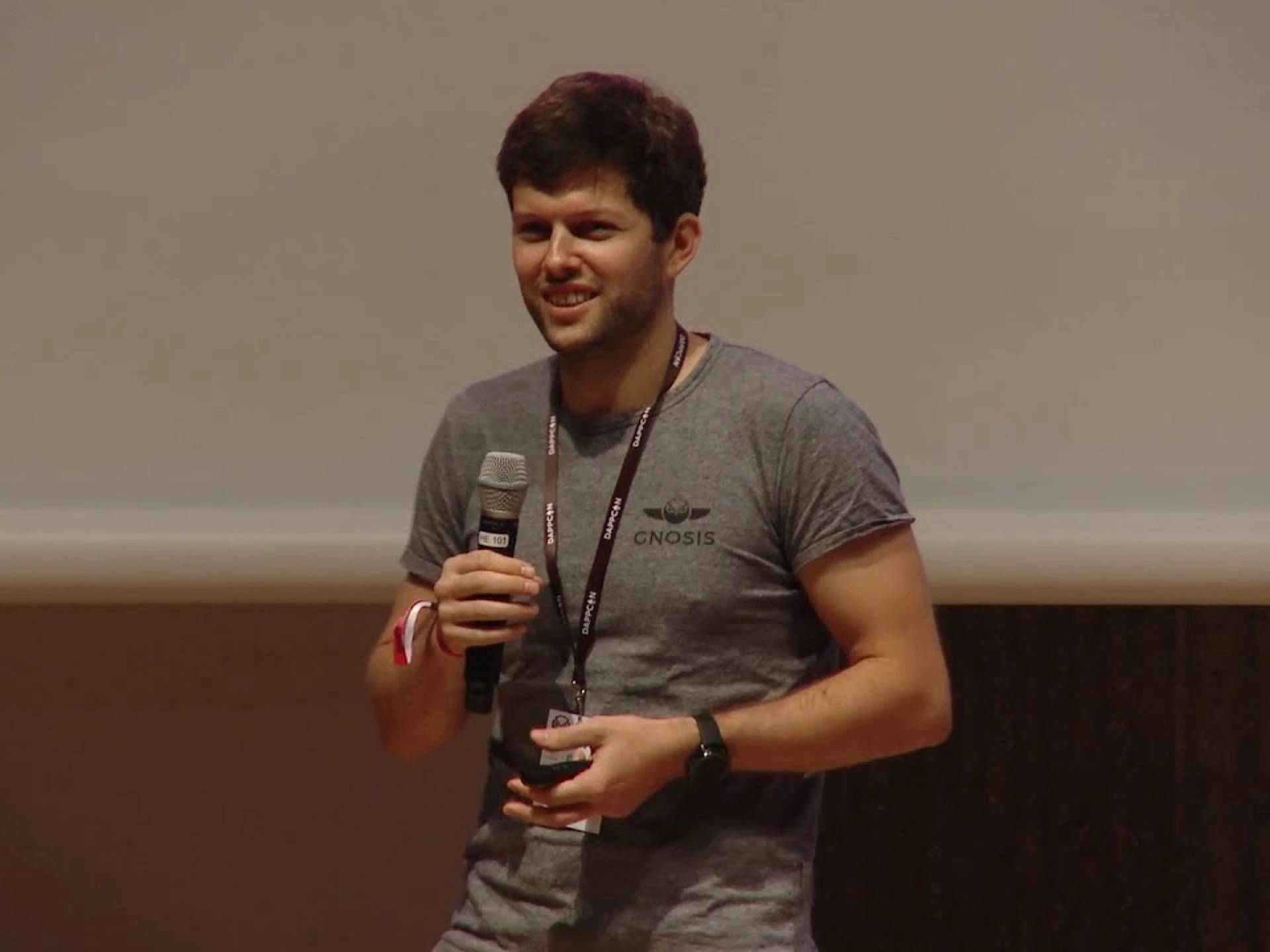위키 구독하기
Share wiki
Bookmark
Stefan George
0%
Stefan George
스테판 조지는 Gnosis의 공동 창립자이자 최고 기술 책임자(CTO)입니다. Gnosis는 블록체인 프로젝트로, 이더리움 생태계의 유틸리티 확장과 탈중앙화 예측 시장 플랫폼을 위한 인프라 도구를 제공합니다. IT 시스템 엔지니어링 배경을 가진 조지는 Gnosis에서의 업무와 업계의 다른 직책을 통해 블록체인 애플리케이션 발전에 기여했습니다.[6]
교육
스테판 조지는 2010년에서 2013년 사이에 Hasso Plattner Institut에서 IT 시스템 엔지니어링 석사 학위를 받았습니다. 그 이전에는 2007년부터 2010년까지 Universität Potsdam에서 IT 시스템 엔지니어링 학사 학위를 받았습니다.[4]
경력
스테판 조지는 2011년 SAP Labs에서 연구 인턴으로 전문 경력을 시작하여 Palo Alto 및 Potsdam 팀과 함께 iPad 애플리케이션 개발에 기여했습니다. 2015년에는 Consensus Systems (ConsenSys)에 합류하여 Gnosis의 CTO로 이더리움 네트워크에서 탈중앙화 애플리케이션 (dApps)을 만드는 데 집중했습니다.
조지의 블록체인 기술에 대한 관심은 2013년 비트코인에서 시작되었으며, 결국 이더리움에 참여하게 되었습니다. 2017년에는 Gnosis Limited를 공동 설립하여 CTO로 계속 근무하고 있습니다. 그의 리더십 하에 Gnosis는 12분 만에 1,250만 달러를 모금한 초기 코인 공개 (ICO)로 인정을 받았습니다.
Gnosis는 탈중앙화 거래소에서 프론트 러닝 및 결제 지연과 같은 문제를 해결하는 솔루션으로 인정받고 있습니다. 조지는 유동성을 집계하여 잠재적으로 더 공정한 가격을 제공하고 프론트 러닝 위험을 완화하는 배치 경매 개발에 중요한 역할을 했습니다.
기술적 기여 외에도 조지는 탈중앙화 애플리케이션의 유용성과 접근성을 향상시키는 것을 옹호합니다. 그는 사용자 인터페이스를 단순화하고 개인 키 관리의 복잡성을 줄여 블록체인 기술의 광범위한 채택을 촉진하기 위한 노력을 지원합니다.[1][2][3][5]
인터뷰/패널
탈중앙화 거래소 채택의 장벽
스테판 조지는 뉴욕 브루클린에서 열린 Fluidity Summit에서 탈중앙화 거래소 (DEX)와 Gnosis의 접근 방식에 대해 논의했습니다. Gnosis는 이더리움에서 예측 시장 프레임워크를 개발하기 위해 만들어졌으며, 새로운 유형의 예측 시장 결과 토큰과 필요한 거래 인프라를 만들고 이더리움 생태계의 유틸리티를 확장하는 데 중점을 둡니다.
Gnosis는 프론트 러닝을 방지하고 공정한 가격 발견을 보장하기 위해 배치 경매를 사용하는 DEX인 DutchX를 개발했습니다. 조지는 DEX가 사용자에게 자산에 대한 완전한 통제권을 제공하고 규제 제약에 직면한 중앙화 거래소와 달리 모든 토큰을 상장할 수 있는 기능을 제공한다고 강조했습니다.
그는 DEX 채택의 주요 장애물은 유용성과 확장성이라고 말했습니다. 개인 키를 관리하고 이더리움 개념을 이해하는 것은 주류 사용자에게 복잡하며, 이더리움의 현재 제한 사항은 DEX 성능을 저해합니다. 조지는 사용자 상호 작용을 단순화하고 트랜잭션 처리량을 향상시키고 비용을 줄이기 위해 Plasma와 같은 레이어 2 솔루션을 사용하는 것을 제안했습니다. 그는 DEX가 몇 년 안에 중앙화 거래소를 대체하고 결국 전통적인 금융 시장에 영향을 미칠 수 있다고 예측했습니다.[7]
예측 시장
스테판 조지는 현재 강세장으로 인해 예측 시장에 대한 관심이 높아지고 있다고 논의했습니다. 이러한 급증은 특히 미국 선거와 같은 주요 이벤트와 관련하여 더 많은 참가자와 재정 자원을 유치했습니다. 그러나 조지는 단일 이벤트에 대한 과도한 의존의 위험과 시장을 다양화하기 위해 더 광범위한 매력적인 주제가 필요하다고 지적했습니다.
그는 예측 시장의 중요한 과제 중 하나는 유동성이라고 말했습니다. 유동성을 제공하는 것은 자본 집약적이며 충분한 거래 활동이 있어야만 수익성이 있으며, 이는 예측하기 어렵고 종종 손실로 이어집니다. 시장 조성에는 정교한 알고리즘, 특히 선거 또는 스포츠와 같은 반복적인 이벤트에 필요하며 기존의 자동화된 시장 조성자는 특수 알고리즘만큼 효과적이지 않습니다.
조지는 AI가 예측 시장을 변화시킬 잠재력을 강조했습니다. 인간은 복잡한 결과에 정확한 확률을 할당하는 데 어려움을 겪지만 AI는 자세한 예측을 처리할 수 있습니다. Gnosis는 예측 정확도를 향상시키기 위해 Gnosis Chain에서 다양한 AI 모델을 사용하고 있습니다. 시장에서 경쟁하는 여러 AI 모델의 도입은 정확도를 높이고 유동성을 높이며 많은 새로운 예측 시장을 열어줍니다.[8]
잘못된 내용이 있나요?
